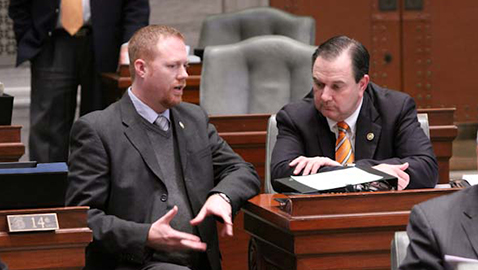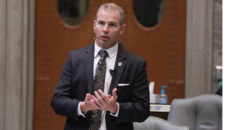By Collin Reischman

Jefferson City, Mo. — Sen. Jason Holsman, D-7, was always headed for a career in public service, he says. After running a doomed Senate campaign in South Carolina challenging the longtime incumbent, Strom Thurmond, Holsman went to work as an intern for Senator Kit Bond.
Wearing his “only suit,” Holsman walked the halls of the Capitol, handing out his resume and hoping to find work in the public arena. An educated Democrat, Holsman turned a few heads when he took a job with then-Senator John Ashcroft, the staunchly-conservative Missourian who would eventually go on to become Attorney General of the United States.
Holsman described himself as a man who believes in limited government concerning a citizen’s self-regarding behavior, but said that Senator Ashcroft’s brand of conservatism was based on hypocritical inconsistencies.
“I found that Sen. Ashcroft was paternalistic when it came to social issues such as individual sovereignty” Holsman said. “He expressed pocket-book conservatism on taxes while narrowly applying his limited government principles in favor of wealthy corporations. His willingness to legislate moral sensibilities leads us to social nanny state.”
Holsman said he considers a government that regulates the doctor-patient relationship to be too big, which is why he is pro choice. He also considers a government dictating the bonds of marriage, or bedroom behavior, is too big, which is why he supports gay marriage.
Holsman resigned in protest of the blocking of a judicial nominee from Ashcroft’s office, realizing there wasn’t an ideological fit between himself and the Senator.
Holsman, who has undergraduate degrees in U.S. History and Political Science, went on to Norwich University, a military educational institute, where as the only civilian in the program, he earned a Master’s degree in Diplomacy and Military Science. He had done some work with Sprint as a planning engineer before finding his way back to Missouri, where he and his wife, Robyn, now live with their two children.
Holsman began working as a teacher, where his public service career would begin again over an issue all too common, and all too hard to fix, in public schools across the state.
Holsman didn’t have enough desks. For two months, his 36-student U.S. History class had only 23 desks, making it impossible to teach.
“The situation had become desperate,” Holsman said. “Our principal, Dr. Mary Long, shared my frustration and encouraged me to take the issue up with the school board. I had kids sitting on milk crates, waiting to take turns using the desks for testing, the classroom discipline suffered and the circumstance was unacceptable for those students.”
Holsman went to the board meeting and, in his first public speech, told the board his frustration with the lack of desks.
After the meeting, Holsman was confronted by the school superintendent, who was not pleased with Holsman’s admonishment of the board.
“With the Superintendent inches from my face poking a finger into my chest, I pointed to a banner hanging in the auditorium that read, ‘Is it Good For the Children?’ and asked him the simple question.” Holsman said. “He scoffed and snarled before storming away leaving me in an uncomfortable silence — not knowing rather I still had a job.”
The next morning, Holsman was called by the school principle to the loading dock behind the cafeteria, where a truck with more than 70 brand new desks was waiting to be unloaded.
“In that moment I realized that courage and action could lead to results, especially for those who have the greatest need, the fire for public service had been lit.” Holsman said.
That was also when his political career officially began.
In his first race for the House, Holsman had an uphill battle. Out-raised by more than $10,000, with only one endorsement to his opponents 35, Holsman’s challenger had also been hand chosen by the departing incumbent. Nobody thought he had a chance.
“I knocked on 3,000 doors in 50 days,” Holsman explains as the key to his victory.
Holsman learned many lessons from that first race, which he eventually won by 5 points. He says he learned to embrace, not shun, those who don’t support you. He says he learned that victory comes by addition, not subtraction.
He says he learned that victory comes by addition, not subtraction.
“Winners don’t hold grudges, not if you want to win again. You never know when today’s opponent will be tomorrow’s friend,” Holsman said. “This game is about building relationships. Primaries are always tough. But when you move forward amazing things can happen. When I announced for Senate, the major opposition in my State Rep race six years earlier, were the first to endorse my candidacy. As it turned out, their support was crucial to win.”
As one of the more influential minority members of the Senate, Holsman has championed sustainable energy. Holsman’s work on several pieces of legislation, as well as Proposition C in 2008, has created a market for solar energy in Missouri that simply did not exist before 2007. In his district alone, more than 6 megawatts of power on the grid come from renewable solar energy, as opposed to a grand total of zero before Holsman took office.
Whether it was Property Assessed Clean Energy (PACE) in 2009 or his work on encouraging local and sustainable food networks in the state, Holsman calls energy a “national security,” issue.
“Ask retired leaders from the US Military about operational energy strategy and they will tell you that climate change is a global threat to political stability and no standing army can fight it,” Holsman said. “It is a national security priority to have localized, safe, sustainable food and energy resources. We have the technology and the techniques to become energy and food independent, now we just need the political will.”
Holsman the young, articulate and popular Democrat, won’t make any indications about his future in politics.
“The Senate is an awesome responsibility. I believe it takes time to master any craft. I don’t understand why politicians are always in such a hurry to get more power before they understand how to use what they have effectively.” Holsman said. “If my achievements warrant a promotion then the path for higher office will be there. It’s way too early to think about anything beyond being a good Senator.”
But after 4 campaigns against 4 candidates with decisive wins and not a single negative ad campaign or negative mailer, it might be hard for Holsman to ignore the potential for statewide office.
A Democratic party in the state with a relatively shallow bench might find it hard to ignore the hard-working Senator from Kansas City.
“I’d rather be the work horse in front of the plow than the show horse receiving a ribbon.” Holsman said.






